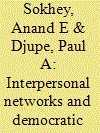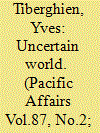| Srl | Item |
| 1 |
ID:
102068


|
|
|
| 2 |
ID:
190082


|
|
|
|
|
| Summary/Abstract |
We analyzed psychosocial influences on political life in the Basque Country according to Doise’s theory on the articulation between the individual, the interindividual, groups, and society. Political-party experiences and evaluations of system legitimacy during elections (local, regional, general, and European) were considered. Party choice was linked to atheism and without-religion among Spanish progressive voters (Podemos); Christianity to Basque conservative nationalism (PNV); Basque identity to Basque progressive nationalism (EH-Bildu); and Spanish identity to conservativism (PP). On the whole, Basque parties’ voters stressed more economy/administration and politicians’ individual traits, while Spanish party voters focused more on civil/social rights.
|
|
|
|
|
|
|
|
|
|
|
|
|
|
|
|
| 3 |
ID:
131066


|
|
|
|
|
| Publication |
2014.
|
| Summary/Abstract |
This article provides a response to Brantly Womack's article in this issue on a multinodal view of the global world and China's rise within it. Has globalization ushered in a new and stable structural system based on connectivity and multinodal networks?
I argue here that globalization may be more fragile and beset with system-level risk than in Womack's view. Its future depends on investment in global institutions and global governance by states and networks of private and sub-state actors. Likewise, states may increasingly be caught in networks of interconnections and dependency, while at the same time they must deal with great social forces and struggles that could yet break key links in the system. In sum, agency, political leadership, and institutions matter. The system is dynamic and interactive. It is vulnerable and dependent on active coordination. Even China's trajectory within this system can take very different paths, based on the political choices of its leaders and other players.
|
|
|
|
|
|
|
|
|
|
|
|
|
|
|
|